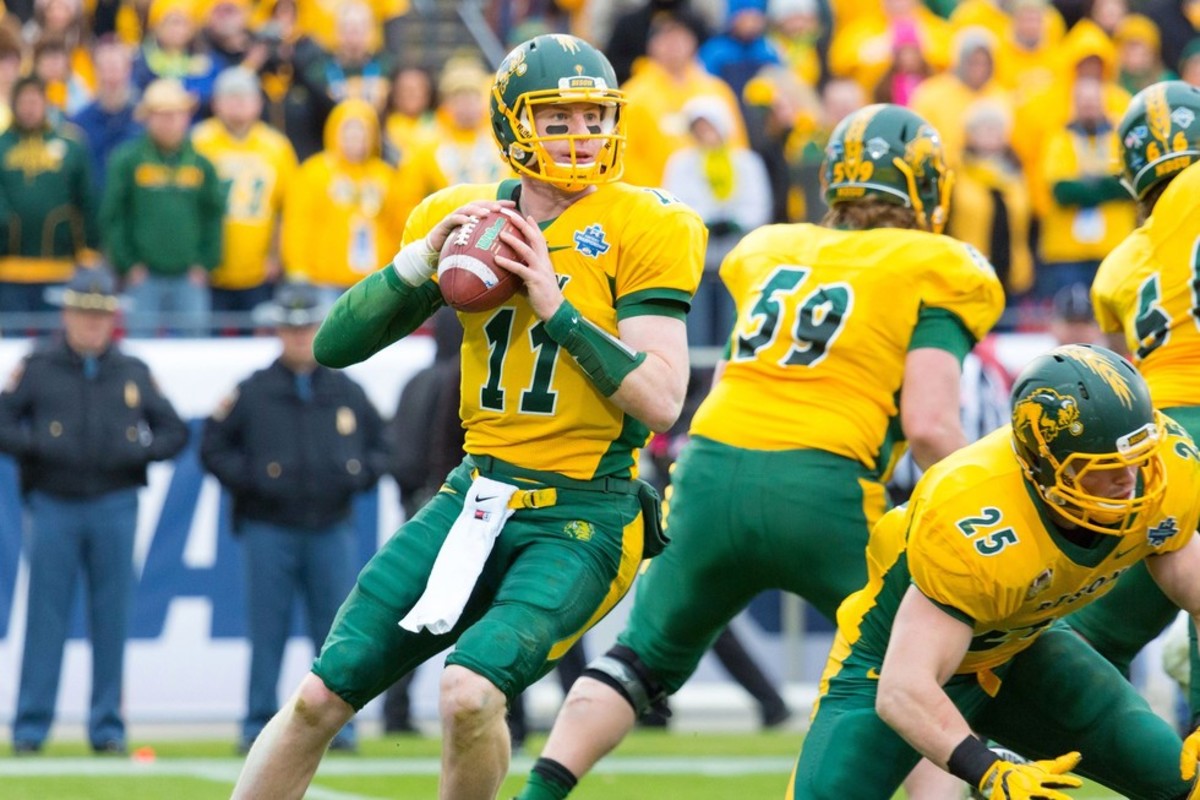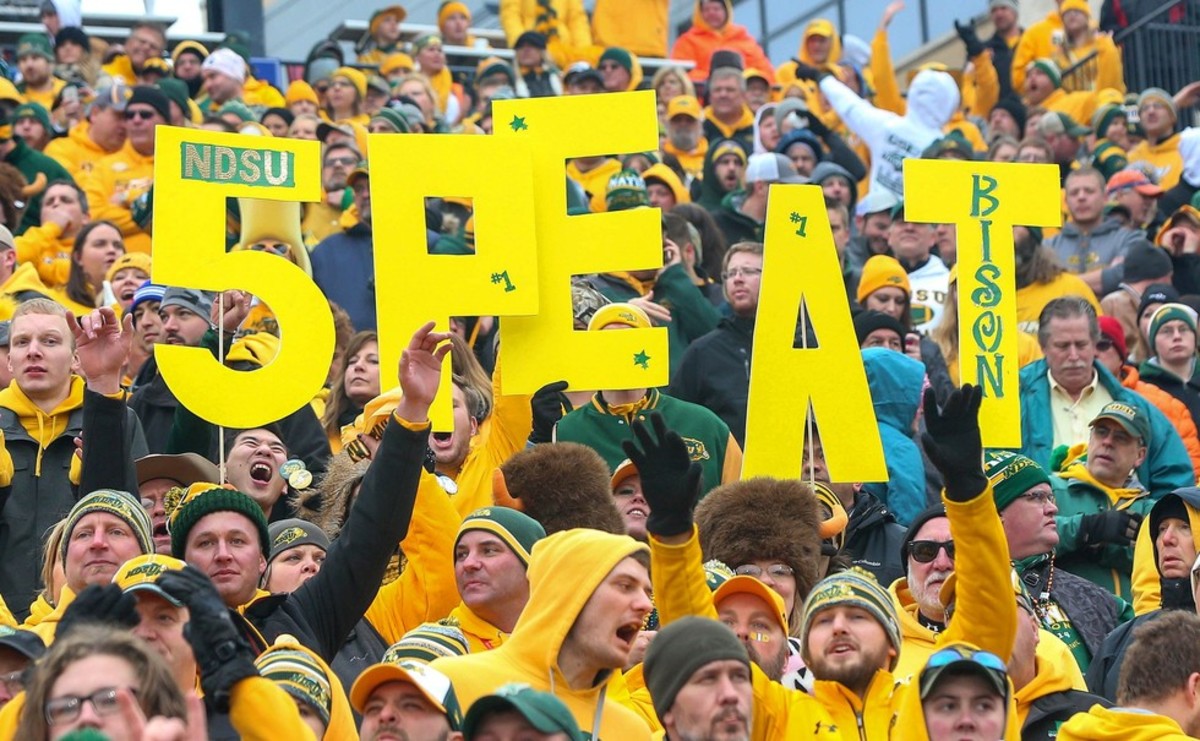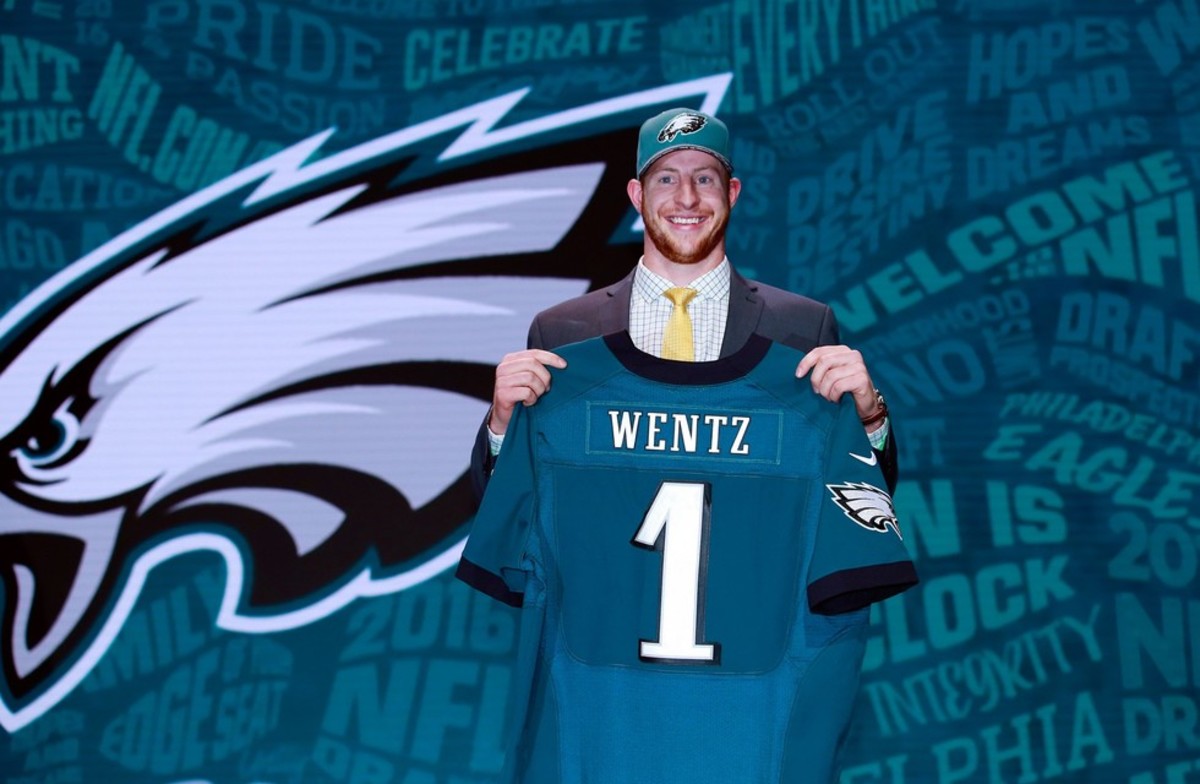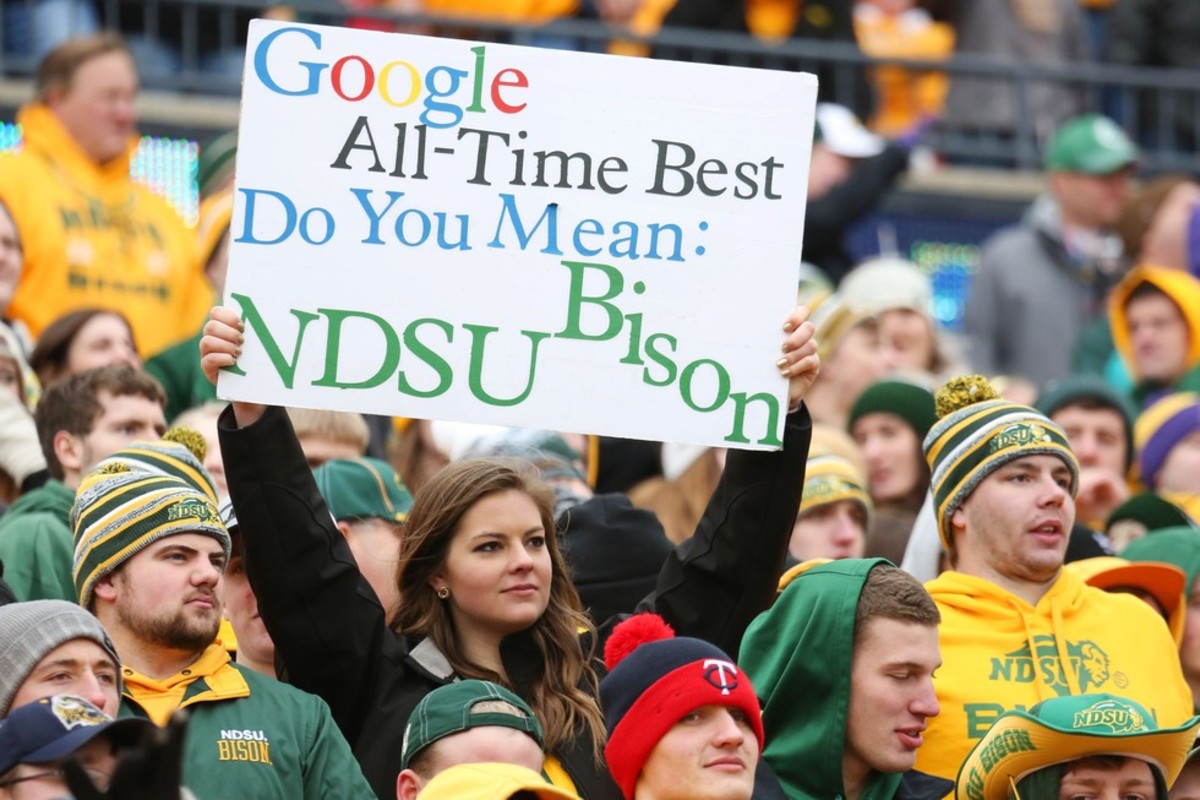Bison Pride: North Dakota State has built FCS powerhouse with five straight national titles and a passionate fan base

[video: 13724854]
FARGO, N.D. — The sign for Herd & Horns is conspicuous from the sidewalk of 12th Avenue, a road that runs along the southern edge of North Dakota State University's campus. It rests on the brick side of a building, with a dark letters spelling out "Herd & Horns" underneath a pair of gold horns. At the bottom, three words are prominently displayed in yellow: Burgers. Beer. Bison.
Inside, bison remains an overt theme. An oversized framed cover of Bison Illustrated, a local magazine dedicated to North Dakota State athletics, hangs next to the entrance. On the cover is a smiling Carson Wentz, the former Bison quarterback who went No. 2 overall to the Philadelphia Eagles in last April's NFL draft, underneath a bold headline that reads, "Could Wentz be the face of an NFL franchise?"
On a far wall, a stuffed bison head towers over patrons below. Across the room, a large portrait of the crew from ESPN's College GameDay depicts one of the show's two recent visits to Fargo, in 2013 and '14. Twenty flat-screen TVs line the walls of the eatery, along with 21 beer taps and an in-house radio booth, from which the student-run Bison Information Network frequently broadcasts. One of the featured items on the menus is "The Cure", a bison burger topped with hash browns, fried egg and bourbon bacon jam. It is billed to "cure whatever ails you."
Co-owner Mike Dragosavich, a former North Dakota State punter, wanted no subtlety when it came to the restaurant's allegiance. "This is what our basement would be like," Dragosavich says. "That was our goal. We had game day in mind when we built it."
Dragosavich, a Chicago native, embraced Bison tradition long ago. Along with operating Herd & Horns, he serves as CEO of Fargo-based Spotlight Media, which publishes eight local magazines, including Bison Illustrated. He owns and operates an outfitter called One Herd Clothing, a premier destination for North Dakota State merchandise. Two of Dragosavich's Herd & Horns co-owners—Todd Fuller and Steve Saxlund—are former NCAA wrestling champions at NDSU. "Everything kind of revolves around the Bison in my world," Dragosavich says, "and I love every minute of it."
That sentiment is not unique to the confines of Herd & Horns. Fargo has long been an epicenter of Bison fandom, but that passion has multiplied in recent years as the school has evolved into a football powerhouse. Last season North Dakota State won its fifth straight FCS national championship with a 37–10 rout of Jacksonville State in the title game. Since the beginning of the 2011 season, the Bison are 71-5, the best mark in college football during that span (by comparison, Alabama is 62-7 with three national titles over that same stretch). And consider this: No player on NDSU's current roster has gone a season without winning a national championship.
A seemingly insurmountable standard has been set, and as the green-and-gold train keeps rolling, the Bison have shown no signs of slowing down. "I think it's going to be really cool looking back on it," NDSU senior fullback Chase Morlock says. "But right now, we're in the middle of it."
*****

AP
Pat Simmers grins when regaling visitors with North Dakota State's rich history. A senior associate athletic director, Simmers played offensive line and wrestled for the Bison in the 1970s before a winding path brought him back to Fargo. Now, the school's immense success has put his own career in perspective. "I always say we weren't very good when I played: We won the league three out of four years," Simmers says with a laugh.
In truth, North Dakota State's success has not been limited to the past half-decade. The football program has won 13 national championships under seven different head coaches in its 122-year history. That tradition began in the 1960s, when university president Herb Albrecht decided to revamp the school's focus on football. The story goes that Albrecht attended a convention and ran into longtime Notre Dame president Theodore Hesburgh. Albrecht asked Hesburgh how to recruit quality student-athletes to North Dakota State, to which Rev. Hesburgh responded, "Get a football coach who can win, and you'll get players."
North Dakota State finished 0–10 in 1962, after which Albrecht hired Darrell Mudra from Division II Adams State. Mudra had compiled a 32–4 record in four seasons with the Grizzlies, and the Bison enjoyed a near-immediate turnaround during his tenure. After a 3–8 record in his first season, Mudra went 21–1 in his final two years in Fargo, winning the College Division national championship with an 11–0 record in 1965. It was the first football national title in school history.
Mudra identified a formula that remains paramount to college athletics: Winning requires investment, on and off the field. "He changed the culture here," Simmers says. "He raised capital before anybody else was raising capital. He raised money. And they worked hard and got tough kids."
After Mudra left for Arizona, the Bison won two more national championships ('68 and '69) under Mudra's replacement, Ron Erhardt, who would later coach for four different NFL franchises. North Dakota State went on to win national titles under coaches Don Morton (1983), Earle Solomonson ('85, '86) and Rocky Hager ('88, '90) before making the jump under Craig Bohl from Division II to Division I (FCS) in 2004.
Today, outsiders recognize North Dakota State largely due to Bohl's tenure. Bohl went 104–32 in 11 seasons in Fargo, helping the Bison become just the second FCS school to win three straight FCS championships (2011–13). That run included a 15–0 season in 2013, only the second undefeated campaign in the FCS since 1996. But in December 2013, Bohl accepted the head-coaching job at Wyoming, leaving North Dakota State as the winningest coach in program history (104 victories).
"I think there comes a time in a coach's life where you look and say, okay, when is mission accomplished and when is there somebody else who can lead this program into a higher level than where I'm at?" Bohl said during his introductory press conference at Wyoming.
The Bison didn't look far for Bohl's replacement. Then-athletic director Gene Taylor tabbed Bohl's defensive coordinator, Chris Klieman as North Dakota State's new head coach. Klieman had been an assistant under Bohl for three seasons, but he turned down an offer to join his former boss at Wyoming. Klieman wanted to carry on the tradition at the powerhouse Bohl left behind. "The question I always got was, 'What are you going to change?'" Klieman says now. "Well, we'd won three national championships in a row. Be careful what you change."
Not much has changed since Klieman took over: North Dakota State is 28-3 in two seasons and has won two more FCS national championships. Last fall the Bison suffered an uncharacteristic two regular-season losses—including a 38-35 setback to Montana in the season-opener—en route to its most recent title. That run included losing Wentz for eight games with a broken right wrist.
North Dakota State's national profile has ballooned recently as the Bison have played 14 games on ESPN networks over past five seasons. ESPN's College GameDay ventured to Fargo for game weekends in 2013 and '14; an estimated 10,000 Bison fans packed the corner of Broadway and 3rd Avenue in a downtown Fargo for GameDay in 2014. (The live bison used by Lee Corso to pick North Dakota State in both seasons still resides in a zoo near Fargo. Its nickname? "Corso".)
For recruits and college football fans outside the state, ESPN's visit provided a peek into the real Fargo, which is too often mistaken for a year-round tundra. "That's advertising you can't pay for," North Dakota State athletic director Matt Larsen says. "It dispelled the notion that Fargo is this frozen, backwards, lost-in-time place. That couldn't be further from the truth."
That's why locals implore outsiders to look beyond the 1996 dark comedy Fargo in assessing their beloved city. "I don't even know if I've seen that whole movie," says Morlock, a native of nearby Moorhead, Minn. "The accents are funny, but it's not quite like that."
*****

AP
Toyota Stadium is a 20,500-seat venue located in Frisco, Texas, a 45-minute drive north of Dallas. It has served as the home of Major League Soccer club FC Dallas since 2005, but for one weekend each January it has been Bison territory. That's when Toyota Stadium hosts the annual FCS Football Championship, which North Dakota State fans have begun to circle on their calendars. "It's almost become a fabric of [winter] around here," says Jeremy Jorgenson, sideline reporter for Bison Radio Network. "More than Christmas."
Frisco has hosted the FCS title game for six seasons, and North Dakota State has played in—and won—the past five. Now Bison fans have become accustomed to yearly ventures to north Texas with the expectation of returning with more hardware. Most choose to drive the full 16 hours across five states, snaking along Interstates 29, I-35, I-70, I-335 and I-470. According to Larsen, some 23,000 Bison fans made the trek to Frisco this past January to see NDSU take on Jacksonville State. That's a couple thousand more than Toyota Stadium's maximum capacity. "That's their vacation," Larsen says. "They save up for that."
Some loyalists venture to Frisco for the atmosphere alone. Jim Hambrick, a North Dakota State alum and bank executive in Fargo, has attended the past five championship games in Frisco and says the parking lots surrounding Toyota Stadium are annually blanketed with green and gold. "It's like going to Fargo South," Hambrick says. "Tailgating down there, it's like you took Fargo and set it up in Frisco. Those who can't snag a ticket trek to Wild Pitch sports bar, a local dive that serves as the school's official watch party location. "Several bars and restaurants in the area have gotten used to us," Hambrick says.
That passion took Larsen by surprise on his first trip to Frisco following the 2014 regular season, less than three months after coming to North Dakota State to replace Gene Taylor as athletic director. On Wednesday of game week, Larsen arrived in Frisco and took his staff to dinner. The group's waitress turned star-struck upon recognizing the herd of Bison at her table. "She said, 'Our staff looks forward to this weekend because we call it "Bison Weekend.'" Larsen says. "That's when you say, wow, we have something special here."
Win or lose, Bison fans don't waste their yearly pilgrimage to Texas. Prior to the title game in January 2012, North Dakota State hosted a pep rally at a Frisco-area Marriott the Friday before the game. Bison administrators approached hotel management beforehand with a warning: You can't have too much beer on hand. The hotel assured NDSU officials they would be stocked.
By 9 p.m., all the beer was gone. The second batch ran dry by 11 p.m. "Afterwards, we got a letter from the hotel," Pat Simmers recalls. "They said, 'We're sorry, we just didn't understand.'"
That passion is derived from the Bison's unique grasp on North Dakota. Like Cornhuskers fans in Nebraska or Alabama and Auburn's annual battle for supremacy in the South, North Dakota natives live and die with Bison football. The closest professional sports franchise is in Minneapolis, a three-and-a-half hour drive from Fargo. For college sports fans in North Dakota, the Bison are the show. (With all due respect to the University of North Dakota's men's hockey program, winner of eight NCAA titles.) It's no wonder fans in the state brand their North Dakota State passion with two words: Bison Pride.
Ask players, coaches or fans to define the term and you'll never get the same answer. For some, that pride is difficult to articulate. In 2015 North Dakota State's staff hosted Jacksonville Jaguars head coach Gus Bradley on campus during spring practice. Bradley played safety and punter at North Dakota State and served as the Bison's defensive coordinator from 1996–2005. During one meeting with NDSU's staff, a Bison coach posed a question to Bradley: What is "Bison Pride" to you?
"He sat there and moved around in his chair for about a minute and a half," says Tyler Roehl, who coaches fullbacks and tight ends at North Dakota State. "He did not know how to put it into words."
A Fargo native, Roehl recognized "Bison Pride" at an early age. He began attending Bison games in middle school, idolizing figures like running back Lamar Gordon, the program's career rushing leader (4,696 yards). Roehl went on to star at North Dakota State as a ball-carrier; he still holds the Bison record for single-game rushing (263 yards). Now a member of North Dakota State's coaching staff, Roehl craves the opportunity to pass along "Bison Pride" to future players. "If you ask me, it's more of a feeling," he says. "It's a lifestyle. When you put it into words, you get goosebumps."
*****

AP
On April 28, a dapper Carson Wentz stepped on the stage at Roosevelt University Auditorium Theatre in Chicago and shook the hand of NFL commissioner Roger Goodell after the Philadelphia Eagles selected Wentz with the No. 2 overall pick in the Draft. In an instant, the Bison went from under-the-radar FCS powerhouse to producer of top-tier NFL talent. "What Carson has done for the university, for all our athletic teams, with all the media attention for it," Klieman says, "I don't think you can put a price on that."
Wentz became the highest player drafted out of North Dakota State in the program's history. He also became the highest-drafted quarterback out of non-FBS program in NFL draft history. For a program that prides itself on developing talent and spreading Bison Pride, Wentz—a Bismarck, N.D. native—served as tangible evidence that North Dakota State is more than an FCS aberration.
"North Dakota State football is a perfect representation of the grit and work ethic that makes where I'm from a special place," Wentz wrote in an essay for The Players' Tribune in April.
Wentz wasn't the only North Dakota State player to get drafted. The Indianapolis Colts selected left tackle Joe Haeg in the fifth round, giving the Bison multiple draft picks for the first time since 2002. But while NFL success is nothing new in Fargo—NDSU has produced picks in three straight drafts and had seven active Bison in the NFL in 2015—the program had yet to produce a Wentz-level prospect. "Six [straight championships] would be great," Simmers says, "but I'm not sure it beats the bang we got outta [Wentz]."
Wentz's rise is remarkable when considering scholarship limitations at the FCS level. While FBS programs can offer 85 full football scholarships per year, FCS schools are allotted 63 full scholarships that can be split between 85 student-athletes. Thus, programs like North Dakota State rely more heavily on walk-ons and player development early in their careers. The Bison, in particular, try to use their lack of a depth to their advantage, doubling routine reps in practice so younger players quickly evolve into seasoned veterans.
"The way we practice—double-repping—is tough," Roehl says. "By the time you're a redshirt freshman, you should be able to go and play because you've had so many reps."
Adds Klieman: "We're a developmental program. We don't take many transfers. We're taking kids that are freshmen and getting them invested in the program so they don't want to leave."
That approach has worked for North Dakota State, even against FBS competition. The Bison are 8–3 all time against FBS teams, having won five straight since 2010. They most recently beat Iowa State, 34–14, in Ames in 2014, and a year earlier they spoiled Kansas State's stadium dedication to longtime coach Bill Snyder by upsetting the Wildcats, 24–21. This fall the Bison travel to Iowa on Sept. 17, and the program has games set against Oregon (2020) and Colorado (2024) in the future.
For some on North Dakota State's roster, matchups with FBS teams serve as points of pride. Some players arrive in Fargo still viewing themselves as FBS prospects, but don't receive scholarship offers at that level. Now those same players venture to the likes of Ames, Iowa and Manhattan, Kans., with a chip on their shoulders. "As a player, I treated it like, we're going in there to try to own that field," Roehl says. "They're the same age as us. They practice the same way we do. Keep it simple."
"When we played Kansas [in 2010], I went on the pregame show on their network radio," Jorgensen says. "They said, tell us what to expect from NDSU. I said the number one thing is, when we run out of the tunnel we don't look like an FCS team. I saw them after the game after we'd beaten them [6–3], and they said, 'Wow, you were right.'"
North Dakota State might appear impenetrable, but the program has weathered its share of storms. After losing to Montana to open last season "you would have thought the sky was falling in Fargo," Klieman says. The Bison even lost a second game to South Dakota in October. Plus, North Dakota State had to absorb Wentz's eight-game absence during the second half of the season; the quarterback wasn't cleared to play until the week of the FCS title game in January. In the end, the Bison captured a five-peat anyway, lending credence to the program's depth and process.
(Earlier this month North Dakota State faced a media controversy when the school instituted a new policy restricting the local media from airing live press conferences, showing extended highlights and airing radio shows on school grounds on game days. After a national backlash, the school president got involved and the policy was rescinded.)
But the notion that North Dakota State cruises through its annual FCS schedule is a misconception. The Bison work hard to prevent complacency. Current recruits are lured to Fargo by a simple pitch: Every player on our roster has won a national championship. But North Dakota State's staff makes sure the program turns the page at the right time. When players first return to the weight room following a national title game, they are barred from wearing anything honoring that championship—unless it's turned inside-out. "We move on," Roehl says.
The next Carson Wentz could help the Bison move on in 2016. Perhaps that moniker is unfair to senior linebacker Nick DeLuca, but after a 2015 season in which he set a North Dakota State record in solo tackles (59), he became the only FCS player to land on the Butkis Award Watch List this off-season. Now Klieman refers to DeLuca as the "quarterback" of his defense.
DeLuca, and Omaha, Neb., native, grew up dreaming of starring for his home-state Cornhuskers, but after fielding just one FBS offer (Ohio University), he was sold by the Bison's sales pitch. Three years later, DeLuca is the program's top NFL prospect, hoping to mirror the success of his former teammate. "Carson's done everything about that to a T," DeLuca says. "I just try to follow that mold and continue that tradition."
At the moment, DeLuca isn't focused on his NFL future. But he does have one request concerning his eventual destination. "After being up here," DeLuca says, "probably somewhere warm."
*****

AP
Chris Klieman rests comfortably on a sofa in his Fargodome office, seemingly unfazed by the immense expectations his job entails. "I know this isn't gonna go on forever," Klieman admits. "But it's hard for anybody to go down into that locker room and tell them it's not going to go on forever, because they always expect to win and find a way to win."
Now Klieman and North Dakota State must find a way to keep it going after losing the highest-drafted player in program history. Luckily for the Bison, sophomore quarterback Easton Stick went 8–0 in Wentz's absence in 2015 and is the unquestioned starter entering fall camp. DeLuca and North Dakota State's front seven might be the strength of the team this fall. If the Bison's offensive line can absorb the loss of Haeg at tackle, the program can continue its championship run.
But North Dakota State's success seems untethered to players and coaches. Klieman has two national championships to his name as a head coach, but six men won titles in Fargo before him. No matter what happens in 2016, it's clear the Bison aren't going anywhere. "They've had a tremendous amount of success dating all the way back to the '60s," Klieman says, "and they're going to have a tremendous amount of success when I'm gone, and the next guy's gone and the next guy's gone, because of the tradition and the commitment the community and the administration puts towards athletics."
These days Matt Larsen, North Dakota State's athletic director, gets one question more than others: Will the Bison ever move to FBS? While Larsen can't predict the future, he knows Bison faithful don't want to sacrifice winning for a boost in profile. "I think we have a unique niche right now, with the opportunity to compete for a national championship," Larsen says. "There are a lot of programs or conferences that will never have a chance to play for a national championship. I think that resonates with our fan base."
On the second floor of the Fargodome, in the expansive lobby of North Dakota State's football offices, a well-lit wall is packed tight with all 13 national championship trophies. Down the road, the university bookstore boasts T-shirts that show a cartoon hand weighed down by five championship rings. The 2015 title, the shirt says, is "One For The Thumb." A championship standard is evident in every nook and cranny of Fargo, with bumper stickers and posters and sweatshirts plastered with the hashtag #bisonpride. Never mind the official definition of that phrase; for Bison fans, what it represents is far more important.
"It sends chills up my spine when I drive home on Friday night, after our meetings end, and there are RVs and cars waiting in line for a mile or two, spending the night so they can be first in line at the Fargodome," Klieman says. "I haven't been to Michigan, Ohio State, those things. But of all the FCS places I've been to, there's no comparison how passionate these fans are at a tailgate."
That's Bison Pride, Coach.
